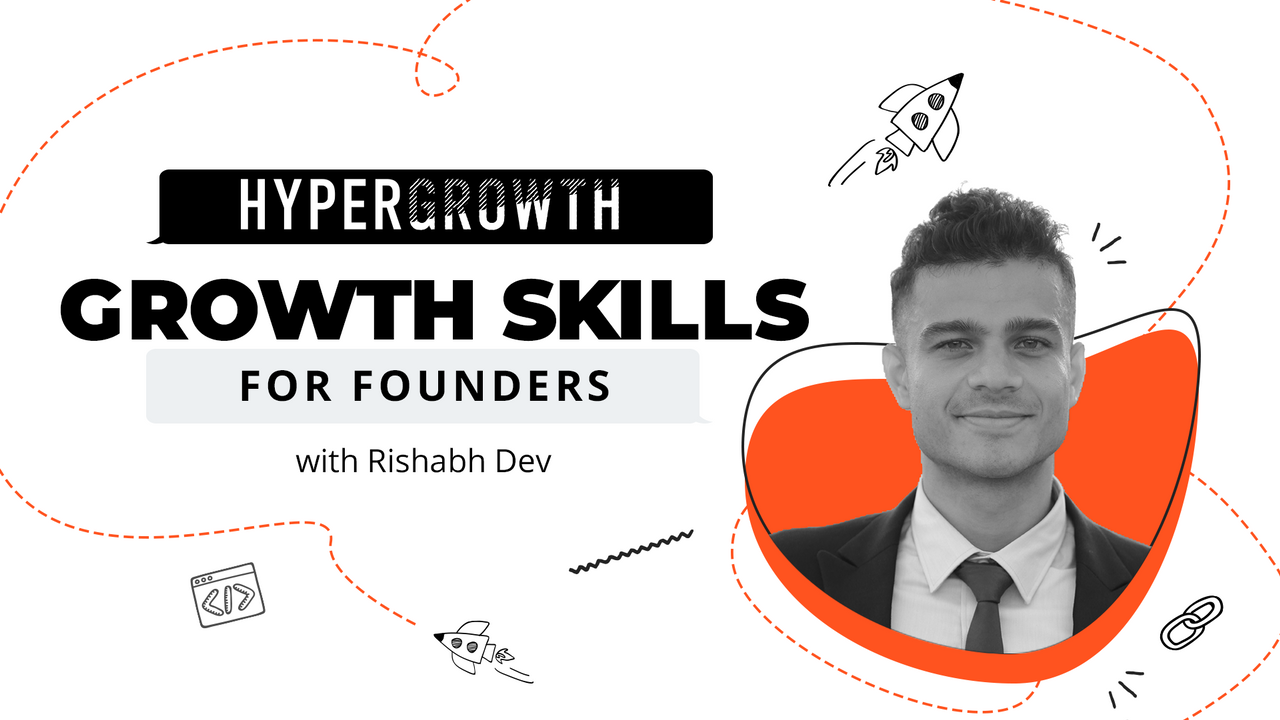Key Growth Marketing Skills You Need as a Startup Founder

As a founder, you're wearing many hats. Do you need to learn the ins and outs of growth as well? According to our new interview guest, the answer is "Definitely!" But you also need to be smart about it and learn the right skills – the ones related to managing and directing the growth process. Today, we'll discuss the growth skills founders need to master and the ways you can do that with Rishabh Dev.
Rishabh has some serious experience in teaching growth marketing skills. He has trained 15,000+ entrepreneurs and marketers through his courses and his growth marketing process is recommended by teams at Oracle, National University of Singapore, NUMA, Java, Alcatel, Philips, Accenture, and more.
Rishabh says his growth skillset framework has been in the making for 5 years before he actually started teaching it to growth teams and entrepreneurs – and the level of detail in his growth skills pyramid really proves it. It's a great quick way to conceptualize the type of marketing skills you need in your brain stack.
I knew Rishabh has a lot of experience teaching growth marketers but I wanted to drive the discussion in a different direction: what growth skills are specifically needed for founders?
Keeping your feet on both sides
Founders generally come from diverse backgrounds and their skills would vary. You have the technical founder, the business development founder, the visionary founder... But one thing they need to have in common is the ability to see the big picture and understand the high-level logic and requirements behind different business functions.
According to Rishabh, growth is a particularly tricky thing to manage. That's because it's a bridge between two sides – the marketing and the technical side. "Growth marketing requires everyone to be on the same page," Rishabh says: "Because growth marketing involves both tech and marketing, founders tend to miss out on the whole picture of what's exactly happening because they need to know both sides." To be efficient, founders need to understand both. So if you're running your own startup, make sure you have a high-level understanding of the side you're not completely versed in.
Building your growth skills as a founder has the added benefit of pleasing investors, too. "Investors are looking for amazing growth marketeers and growth marketing mindsets in founders of startups," Rishabh says. So if you demonstrate growth knowledge, you're that much more likely to secure your next round.
The Growth Skills Pyramid
Rishabh puts growth marketing skills in three distinct buckets. The categories are listed in order of importance, with each building on top of the previous one.
First comes the Fundamental skillset. This category includes skills and notions that everyone should be aware of – from the founders to the newly hired intern. This also includes the key questions for startup success like what is the metric the entire startup is focusing on right now.
On top of that comes the General Growth skillset. These are skills that founders should understand on a high level and would ideally go a bit more in-depth on a few of them. However, Rishabh is quick to note that you do not necessarily need to develop them all.
Finally, we have the Specific Growth skillset. These are skills for the team that's actually executing the growth strategy. Some understanding of what is happening at this level, but they don't need to know what is happening with each specific skill.
Fundamental growth skills for founders

In his Growth Skills Pyramid, Rishabh lists a set of eight key skills. However, not all of them are crucial for founders. We did a deep-dive into the ones that are.
Managing the growth marketing process
Usually, the core growth team would involve a technical person, a data person, and a typical marketeer who works on audience targeting, copywriting, and so on. There would be a person managing the process and in young startups that can often be the founder. Even if that's not the case, you need to be able to jump in and quickly understand which step of the growth marketing process are we currently on — ideation, running experiments, decision-making — what comes next, and how can you drive the process in the right direction.
Visualizing the funnel and understanding the user's journey
Different campaigns and experiments require a different approach. Some are execution-heavy and there's a specific set of steps you need to follow. Others connect different elements of the funnel in intricate ways. As a founder, you need to be clear on what's the whole process to attract, activate, and retain a user. As Rishabh says, "Understanding by looking at a person what stage of the funnel they are in and what we should be doing in that stage of the funnel to guide the user through it is a very important skill."
While growth teams will be focusing on separate experiments guided by the current goal of the startup, founders need to look at the big picture and identify what's missing from the funnel. It's the moment when you need to change the course of your growth team. For example, "Hey, we're great at acquisition, let's start some experiments for referral campaigns."
Using data to make decisions
"I'm not saying that every startup founder should be a data scientist," Rishabh is quick to note: "but they should be able to make sense of what data they are given and make the right decisions." Or, I might add, make some decisions – because analysis paralysis is a common threat, too.
The challenge here comes from the fact that growth is about running many small, highly-focused experiments. As a founder, you will be the one with enough context and vision to pull all the data from disjointed campaigns and bring it together. And this also means you need to recognize situations where the experiment didn't move the needle for the preselected metric but can be used in a different part of the funnel.
General and specialist growth skillsets

The second level of Rishabh's pyramid is the general growth marketing skillset. It covers key all-encompassing skills like content, design, psychology, technology, analytics, CRO and A/B testing. These may not be things a founder deep dives into but if they do, Rishabh notes, this would give them "an extra edge over the other founders out there".
Usually, founders will pick a few of these that are aligned with their general background. Tech founders would usually focus on growth technology, CRO, or analytics, while marketing founders would focus on content and customer psychology. Our advice would be to also take a dip in fields that are farther away from your past experience. This will help you understand both perspectives to growth that we outlined at the start.
The final third level of the pyramid is reserved for skills related to growth execution. These are not something founders would typically focus on.
How do you develop growth skills as a founder?
The answer Rishabh gave was definitive: "You need to see one growth marketing campaign end-to-end. No matter what books you read or courses you take." This is the only way to understand what goes into planning, setting up, executing, and analyzing an experiment. Obviously, that won't be your main job as a founder. But you can gain a lot of insight by immersing yourself in the process.
Rishabh also shared some common mistakes founders make when it comes to growth. You can hear all about them in the recording of our conversation that you can see in the Hypergrowth Talks Library.
What are the first growth hires you need?
Finally, we talked about assembling growth teams. I really wanted to know what would Rishabh recommend as a first growth hire. His answer was short and to the point.
The first thing you need to assess is if the person is experiment-driven. "It's not a skillset characteristic but a mindset characteristic," says Rishabh. And we might add it's a very important one. The easiest way to recognize a person that's experiment-driven is that "they won't be very emotional about the marketing methods they use." If a campaign calls for paid ads, they will use paid ads. If it's about improving visibility through SEO, they'd focus on that.
If they tick off the first box, then you need to look for depth of knowledge either in tech or marketing. If it's a tech-focused growth person, they'd be able to build different frontends to test what works and what doesn't. If the person is marketing-focused, they should know the ins and outs of advertising, content, and audience targeting. "One person who's able to deliver value to the user from a frontend perspective and one person who's able to reach that audience faster and test that audience. Those will be my first two hires," Rishabh sums up.
Learn by doing, surround yourself with experiment-driven people
The one thing that Rishabh was very clear on is the fact that you need some practice to master growth skills. This will help you understand the nuts and bolts that go into both the tech and marketing side of growth.
So go ahead and get your hands dirty!








